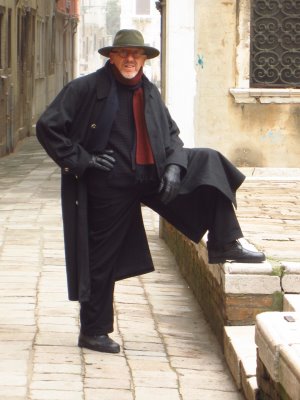
 Lucire has frequently covered ballet and travel, and we’ve reviewed hundreds of books. As a treat to readers during this high season for novels, we serialize in the upcoming weeks The Crimson Garter, book one of the Captain Blackpool trilogy, by travel editor Stanley Moss, writing pseudonymously as Lovejoy
Lucire has frequently covered ballet and travel, and we’ve reviewed hundreds of books. As a treat to readers during this high season for novels, we serialize in the upcoming weeks The Crimson Garter, book one of the Captain Blackpool trilogy, by travel editor Stanley Moss, writing pseudonymously as Lovejoy
Dramatis Personæ
Captain Harry Blackpool, late of His Majesty’s Guards
Grazia Rosetti Marsh, a.k.a. ‘La Fragolina’, prima ballerina of the Paris Opéra
Sir Robert Marsh, Scottish Laird of Marshmoor, and husband of Grazia
Lady Dorothea Marsh, mother of Sir Robert
Vittorio Rosetti, Grazia’s disgraced brother, now living in the New World under the alias Rodolfo Lopez
Ynez Sylvain Delacroix Lopez, wife of Vittorio Rosetti
Laszlo, Count Kozlowski, a nobleman of Prague, pursuing a career as an artist while living in Paris under the assumed name ‘Balthazar’
Misha Stefan, childhood friend to Kozlowski, also living in Paris
Gertrud von Thyssen, Czech heiress, the Countess Kozlowski
Humphrey, Earl of Pinckney, a foppish London aristocrat and traveller
Bernadette Charbonneau, servant girl and dresser to Grazia at the Paris Opéra
Baron Schluysen-von Holstein, esteemed patron of the arts in Paris
Dragobek I, late Prince of Prague and friend to Count Kozlowski’s parents
Dragobek II, Prince of Prague and Count Kozlowski’s childhood rival
Tatiana Stregova, ballerina to the Paris Opera, and Grazia’s rival
Mme Monitchka, ballet mistress in Paris
Viktor, king of the gypsies
Miscellaneous scoundrels and rogues of the underworld
Chapter 1
The eyes were there again, brooding, perhaps glowering, from beyond the footlights, the fourth row centre, as they had been for the entire week. Every night she had seen him as she danced her final performances, and his dark eyes never left her. She had seen him when the curtain went up, and he never looked elsewhere, his expression never changed. She had seen him from the wings, from the narrow slit of the curtain parted at entr’acte, even as she waited onstage between her solos, and he never watched the corps de ballet, only her. At the end of the performance he was on his feet with the crowd, applauding wildly, and at her reverence she found his attention on her yet again. She had seen this kind of behaviour before, men obsessively infatuated with her, men who did the most outlandish things, but never before with the deep and unmistakable intensity of his eyes.
Paris had been taken aback when she announced her retirement, and the public reaction had made it such that she could no longer venture safely out. Once the news was known she had needed Monitchka at her side everywhere to fend off the adoring and the curious. Paris loved a scandal, and here was one infused with mystery. Why the sudden retirement of the prima ballerina of the Paris Opera? No satisfactory reason was given. Where would she go? Nothing of her plans had been revealed. Had it to do with the bitter rivalry between herself—Grazia Rosetti, known to all of Paris as La Fragolina—and Tatiana Stregova, whom the cognoscenti called the Black Swan? Stregova could only nod enigmatically when asked, but in reality she possessed no more information than the simplest man on the street. Monitchka did not know, the Director of the Opera did not know, even Baron Schluysen-von Holstein, the greatest patron in Paris, had not a clue.
La Fragolina had been famous before, and now she was notorious. She could not easily go to a restaurant, for she was followed everywhere by a relentless gaggle of journalists who called out questions to her, ever more personal, ever more intrusive, until she was safely within the elegant premises. And once inside strange men immediately began to send champagne to her table, buckets of strawberries arrived, and Monitchka was forced to strike out with her umbrella at those fools impolite enough to approach her banquette. Notes written in elegant hand on fine textured paper were delivered to her, all returned unread, and ornate jewellery boxes returned unopened. She could not enter a salon without spontaneous applause. She could not leave without the room coming to its feet. She longed for privacy, quiet, and the freedom to walk unpursued. She needed to sort out the details of her own life, yet the attention was incessant, like a loud buzzing noise that would not go away.
But now the ultimate moment on the stage was at hand, the farewell bows of her last performance in The Gypsy’s Daughter, her signature role, and one with which she would always be associated. Her final reverence to thunderous ovation, and flowers, endless flowers, notes, silks, baubles, raining down around her until the stage before her was carpeted with offerings, and through it all the dark, piercing eyes of the mysterious man in row four.
She did not know it, but another set of eyes followed her from the balcony, those of Captain Harry Blackpool, late of Her Majesty’s Guards. He too had watched the performance with rapt attention. His presence was unknown to anyone else in the theatre, for he had come in disguise. It was, for Captain Blackpool, an exceptional occasion, since he had never before been retained to shadow a charming and talented performer.
La Fragolina stood, half-mesmerized by the swirling sounds and rain of blossoms and the riveting glance of the man. As she always did she searched the crowd for the face of her brother Vittorio, lost to her these seven years. He was not to be seen, though the memory of his incredible suicide was fresh in her mind, as if it had happened yesterday. She still looked for him, every performance, holding a faint hope that one day she would meet him again, with the news that it had all been a horrible mistake. Vittorio, whose unfailing optimism and constant protection had carried her through their darkest days. Her reverie was broken by the harsh whispers of Monitchka from the wings. ‘Fragolina! Make your reverence again and get off the stage quickly!’
Grazia Rosetti came back to her senses and saw why: a throng of admirers were surging down the aisles toward the orchestra pit. In moments they would scramble to the stage, envelop her, and she would be swept above their heads on their shoulders, carried she knew not where. As elegantly as she could she made her bow and fluttered to the curtains, where Monitchka wrapped her in a silken shawl and hustled her through the scenery, past stage hands and cast members all desiring one last contact with her before she departed their company forever. They wound around the cart from the village scene, threaded down staircases and corridors, through dusty hallways illuminated by flickering lanterns, passageways she knew so well she could have walked them with her eyes closed, past glowing doorways to dressing rooms where the sound of laughter from the chorus drifted out, where the rustling of crinolines from the tutus mixed with the happy conversations of the corps, and within a single doorway which she swept by—Monitchka still babbling meaningless words to her—the cold stare from Tatiana Stregova, who would the next night take the stage as the new prima. ‘An invitation from the Baron tonight and you turn it down?’ she realized Monitchka was saying. ‘It is terribly rude and will not be forgiven!’
At the end of the hall, in the tiny dressing room La Fragolina occupied, the servant girl Bernadette Charbonneau attempted to make some order. It was nearly impossible in the cramped space barely larger than a closet, which overflowed with baskets of strawberries in various states of aromatic ripeness, bundles of flowers stacked almost to the ceiling, and a rough wooden crate dragged in at the last minute to hold innumerable boxes and letters which continually arrived, the work of ardent admirers. It overwhelmed poor Bernadette, who had already once that day summoned carts from the Montparnasse Orphanage, which had arrived and been loaded with bushels of strawberries and flowers and sent away. Yet the room filled twice again with more of the same. In exasperation, Bernadette shoved a basket under the dressing room table to clear a space on the tabletop for the towel, flask of cologne, and glass of water which Madame would expect, as she did after each of her performances. Impulsively the servant girl grabbed for the glass of water and guzzled it down. Not only was the room redolent with fruity and floral scents, it was oppressively hot and humid. She quickly refilled the glass, moments before La Fragolina thrust open the door and stepped around the boxes which blocked her path to her chair. Through the open door Bernadette could hear the ovation, which had not abated since Grazia Rosetti had left the stage, and the last of Monitchka’s chatter as she strutted back to the wings.
‘Close the door, Bernadette. Why do you look so morose, my dear? It is not the end of the world! Are you still mooning over the tragedy of your own situation? You will find another job! Courage, girl!’
Bernadette unconsciously placed her hand in her apron pocket and felt a gold Louis a gentleman had given her earlier that evening. She was consumed by guilt for accepting it, and for agreeing to do what he expected, but it was a fantastic sum to receive at once, and would have taken her months to earn, and she could not refuse, now that her position with La Fragolina was soon to end. She debated telling La Fragolina about it, but hung her head. ‘I managed to clear a space for you to sit,’ she said instead. ‘Now I will go and fetch you some cool water.’
How very strange her behaviour, La Fragolina thought, after the girl had left. She had begged to be taken along wherever her mistress was going, but Grazia would hear none of it. ‘If only I could bring you with me,’ Grazia had said. ‘But that is truly impossible, and it is better for you in Paris where you have some future. Besides, I would never wish on another living soul the place where I must go. I will no longer be La Fragolina. I will not even be Grazia Rosetti.’ This uttered poignantly, with a balletic wave of her arm. The pronouncement mystified Bernadette, but she knew her mistress was not easily dissuaded. It ended the conversation abruptly, and plunged the servant girl into gloomy silence.
Mechanically the ballerina began to loosen the pink ribbons of her dancing shoes, releasing her feet, which had been bound tightly within. She spread her toes wide and considered the odd contours which her feet had developed over the years, musing on the thought of the stories those feet could tell. Soon she would celebrate her twenty-fifth birthday, and she tried to think back on any happy events which had brought her to the Opéra. But all she could summon were visions of the dark and desolate place to which she now was fated to return. She knew Robert would be waiting in a carriage outside in the alleyway, as he had written, and he would certainly be impatient. She longed for one day more in Paris, but she remembered the promise she had made.
She heard the door open, but La Fragolina did not look up, simply leaned back in her chair, closed her eyes, and massaged her right foot, which caused her to sigh with relief. ‘Please Bernadette, come and rub my feet the way you do so well, one last time,’ she said. ‘Put the pitcher down, dear, and give me a few more moments of your company.’ But when she perceived no movement she turned her attention to the entryway, and it was not Bernadette who stood before her. There was no mistaking his identity: the man from the fourth row filled her doorway.
‘How did you get in here?’ she demanded.
‘A gold Louis to the sympathetic tenor who let me in, another to the stage manager who looked away, and one to the maid,’ he said. ‘She was the most difficult to persuade. Her loyalty to you is heroic. But money eventually opens all doors, even yours.’
‘You have wasted your gold with such extravagance, monsieur. You will leave at once.’ Curiosity consumed her as she spoke. His words were well-chosen, and his silhouette seemed imposing where he stood, large shouldered, wide jacket, tousled hair. Backlit in the doorway she could not clearly see the eyes, but the voice was soft, a shade hoarse, confident, spoken just above a whisper, assured.
The man pushed the door slowly shut, yet La Fragolina felt no threat from him. He took a step toward her and she could see that his trousers were flecked with paint, and that the toes of his boots bore the spatters of colours splashed there as well. ‘It means nothing to you that I contrived such an expensive tactic for a single audience with you?’ He had an accent like a Magyar, she thought.
She angled her elegant chin at the rough wood crate near the wall. ‘There are many men in Paris who could easily afford what you claim to have spent. They write me perfumed letters proposing marriage, offering castles. They send extravagant gifts. I refuse them all, so why should I permit your intrusion?’
‘If you will hear me out, if you do not appreciate what I have to say, then tell me to leave and I will go forever.’
This puzzled her. Insistent men usually arrived bearing propositions, offering inducements, always inflexible. This one claimed he had only something to say, and he did not look like the type to offer her diamond pendants or phætons drawn by a beautiful team. There was a noble quality in a poor man spending such a sum to gain her attention. She would listen to his preposterous statement, and certainly send him away.
‘You were quite generous to people who rarely see a gold Louis,’ she said. ‘For your generosity to them I will listen to your speech. But do not hold onto high hopes about how I will respond.’
‘Very well,’ the man said, visibly relaxing. ‘I beg you: please reconsider your decision to retire.’
This the ballerina found perplexing. He spoke first about her career, her passion. Most men came bearing elaborate fantasies they had contrived, intent on making her a fixture in their lives or an ornament on their arms. This man seemed concerned only with the ballet.
‘Your talent is as rare as the red pigment I grind to make brilliant crimson for my paintings. You owe it to your public to remain on the stage, dancing as you do, for as long as you can. Your skill is divine. It is too early for you to leave us, and what are we left with? The Black Sawn? She dances like a kitchen maid, and you dance like a spirit. Her gestures are cold and mechanical, yours are fluid and sensitive. I am a humble painter, and I admit I spent most of my fortune, I have starved to attend every one of your farewell performances. It is true I bribed the people in the theatre to let me visit you tonight. But I do not regret my actions. I implore you: dance at least one more season at the Opera.’
‘That is all you have to say?’ asked La Fragolina. It was undeniable: she felt an inexplicable magnetism from this man. But she could not permit him to be attracted, nor could she allow this chance intersection to alter her life. Too much had been sacrificed, too many events were already in motion. ‘That is the end of your appeal, then?’
‘I had hoped for more,’ he went on, taking a small notebook from his pocket and gesticulating with it as he spoke. ‘I thought you would not make me say the rest. But I see you would never accept an artist like myself, no matter how much I told you I adored you, or showed you proof of how you inspired me, or tried to describe how ethereal you are. I wonder if you could ever believe in the possibility of my love, or whether the love you communicate when you dance truly lives inside of you. Perhaps we are both manufacturers of glorious illusion.’
His eyes, she thought, now that she could see them clearly, looked warm and beckoning, but deep within them she sensed a sadness. ‘How can you know what I would or would not do for love?’ she asked him. ‘You are mistaken if you think I am not moved by your entreaties. But other forces compel me to leave. You do not make it any easier by saying these flowery words to me.’ Her face flushed, and she heaved a breath.
‘Then tell me where you are going.’
‘That I am sworn not to do,’ La Fragolina replied.
‘You are in danger?’
‘No. My life is not in peril. Perhaps my soul.’
Related articles hand-picked by our editors
 Two Parisian hideaways
Two Parisian hideaways
Stanley Moss looks at two distinctive Parisian hotels on opposite sides of town, with very different characters
photographs by Paula Sweet and courtesy Hôtel Le A
 A trio of Parisian delights
A trio of Parisian delights
Hello from the City of Lights, where the brutal cold of February has finally subsided, giving way to mild days which allow the beloved pastime the French call balader, to stroll. Perfect weather for Stanley Moss to write you a love letter
photographed by the author
 Hitting the high notes
Hitting the high notes
Jack Yan interviews Sophie Morris, the unstoppable Otago soprano who is gaining credits rapidly as her career begins
photographed by Nikita Brown/Nikita Brown Photography
Advertisement
Copyright ©1997–2022 by JY&A Media, part of Jack Yan & Associates. All rights reserved. JY&A terms and conditions and privacy policy apply to viewing this site. All prices in US dollars except where indicated. Contact us here.